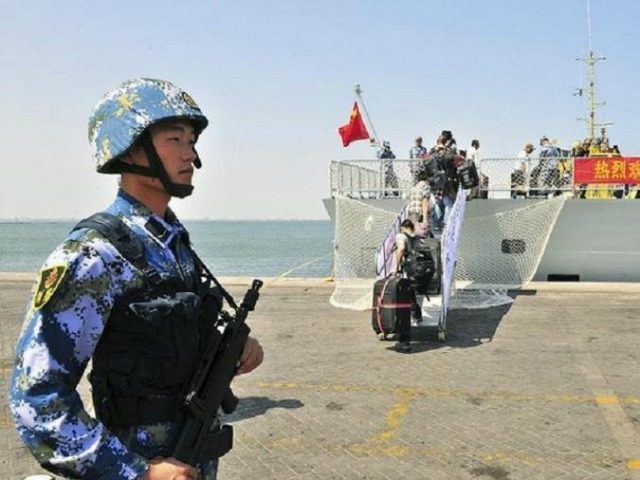The Chinese have struck a deal with the nation of Djibouti to build a military base in close proximity to a critical American military base on the Horn of Africa.
According to PRI, “since 2014, this small chunk of the Horn of Africa, little bigger than the state of New Jersey, has been the only place in the world where the warships of the two countries’ navies are moored alongside each other.”
The Chinese are the second country to cut a deal with Djibouti this year to create a military presence, joining Saudi Arabia, which made a similar agreement early this year. China has invested heavily in the area by pumping billions into Djibouti and neighboring Ethiopia. The new base will both protect their investments and give them increased military presence in one of the world’s most important trading routes.
The Chinese government earlier this year began funding a natural gas pipeline to the main port in Djibouti that Beijing will then export. The major agreement has led some to caution that the government of Djibouti may depend too heavily on Chinese credit to function; estimates show a possible increase in the national debt of nearly 20 percent for the nation by 2017.
China has been increasing its investments worldwide, particularly focusing in Africa on Djibouti and neighboring Ethiopia. The new base will both protect its investments and give increased military presence in one of the world’s most important trading routes. Africa is uniquely situated at the opening of the major shipping lanes of the world. The Suez Canal and the Red Sea are among those major shipping routes, connecting Africa and Europe with Asia.
In an interview with Breitbart News, Captain Pete O’Brien (ret.), a military expert with the London Center for Policy Research, explained that China wants to be the dominate power in Asia. To achieve this goal, it must control passage through the South China Sea and the shipping lanes that lead to it.
Captain O’Brien went on to explain that in The Power of Asia, written by A.T. Mahan in 1900. For China to become the dominate power in Asia and eventually the world, it would not necessarily have to control land, but control the approaches to the land. In the case of the South China Sea, this would mean Singapore in the east and the Suez Canal and the Red Sea in the west. If it can control the flow of trade on both sides, it will hold quite a dominant position in not only Asia, but the world. A base in Djibouti would be pivotal to monitoring traffic in the sea.
The Chinese government is currently embroiled in an extensive territorial dispute in the South China Sea far west of Djibouti. China has declared everything within a self-proclaimed “nine-dash line” its exclusive territory, spanning waters within the borders of Vietnam, Brunei, Malaysia, Taiwan, and the Philippines. It has developed military facilities in the Spratly and Paracel Islands, on artificial islands built on reefs largely considered to be international territory. The Philippines has filed a case at the Permanent Court of Arbitration at The Hague requesting a verdict that plainly notes where the borders of China end. China has vowed to disregard any such verdict.
A robust presence in Djibouti, then, could help secure China’s control around waters far to the west of the South China Sea, while the militarization plan underway in the Spratly and Paracel Islands would help cement its presence in the east. The small nation is situated between the south opening of the Red Sea and the Suez Canal, which in recent years has become the epicenter of regional and international conflict.
Secretary of State John Kerry visited Djibouti in mid-2015, highlighting for the Associated Press that “the mainly Sunni nation has become a critical part of U.S. foreign policy. With U.S. ground forces out of Yemen amid a civil war, Djibouti is a launching pad for drone attacks on al-Qaida and other extremist groups as well as a key transit point for Americans trying to get home.”

COMMENTS
Please let us know if you're having issues with commenting.